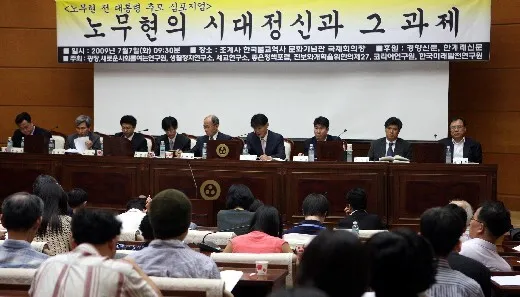hankyoreh
Links to other country sites 다른 나라 사이트 링크
Researchers commemorate values of Roh’s administration

Eight policy and academic research institutions, including Researchers for a New Society and Institute for Future Korea, Gwangjang, commemorated late President Roh Moo-hyun just four days before his internment ceremony held at the end of his 49-day funeral ceremony in a symposium held Tuesday in the international conference room at Jogyesa Temple in Seoul.
In his keynote address, former Prime Minister Lee Hae-chan said that Roh had scolded and awakened South Korea by going to the top of the cliff and with his entire body resisted the negation of the values of democracy and reform in the world of which he had dreamed. He said Roh’s death showed us that the values of democracy and humanism in South Korea have not been fully secured, and that there is still some way to go. He said the nation Roh wanted was a nation that worked on behalf of the people based on democracy and humanism. In contrast, the year and a half of the Lee Myung-bak administration serves as a fresh example of how powerful, determined and senseless the anti-democratic and authoritarian forces and forces of privilege are.
In response to the keynote, Professor Kim Ho-gi of Yonsei University said the Roh administration’s national strategies of participatory democracy, balanced development that included social equality, peace and prosperity in Northeast Asia still had not been realized. Kim also said they will have to be fulfilled in the future or otherwise will carry the significance of a “future gone by.” He praised Roh’s strategic choices as moderately progressive and realistic, made amid epoch transformations of globalization and the information society, however, were found significantly wanting in reducing social polarization and creating social agreement on his policies.
Korea University Professor Jo Dae-yeop said the Roh administration’s governance and communication style transcended the limits of representative democracy, realized participatory democracy and presented a new future for democracy. He said the Lee Myung-bak administration’s attempts to destroy the existing methods of governance, multilateral suppression of civic groups and the regulation of online discussion forums represents the extinction of the micro-democracy attempted by the Roh administration.
Professor Jeong Hae-gu of SungKongHoe University said we need to continue and realize Roh’s value of overcoming regionalism. He said the democratic forces in the Gyeongsang provinces need to form independent alliances to overcome provincial regionalism from within Gyeongsang.
On the matter of foreign policy, Hankyoreh Peace Research Institute head Kim Yeon-cheol, who participated as a discussant, said the most important task in foreign relations was to restore South Korea’s role as a lead mediator. He said Roh had broadened South Korea’s position by taking an active and leading role in resolving the North Korean nuclear issue in Northeast Asia’s international order, surrounded as it is by Great Powers. He said each time North Korea and the U.S. were at a deadlock, South Korea displayed a firm will to negotiate for the denuclearization of the Korean Peninsula and opened an exit by presenting alternatives. The Lee administration, meanwhile, has ignored inter-Korean relations and led to the disastrous result of increasing military tensions on the Korean Peninsula by abandoning South Korea’s active role as moderator.
Please direct questions or comments to [englishhani@hani.co.kr]
Editorial・opinion
![[Editorial] Abandoned appeal in 2019 lawmaker clash case raises questions about prosecutors’ standards [Editorial] Abandoned appeal in 2019 lawmaker clash case raises questions about prosecutors’ standards](https://flexible.img.hani.co.kr/flexible/normal/500/300/imgdb/original/2025/1128/1817643173126142.jpg) [Editorial] Abandoned appeal in 2019 lawmaker clash case raises questions about prosecutors’ standards
[Editorial] Abandoned appeal in 2019 lawmaker clash case raises questions about prosecutors’ standards![[Column] The origins of China’s real estate bubble [Column] The origins of China’s real estate bubble](https://flexible.img.hani.co.kr/flexible/normal/500/300/imgdb/original/2025/1127/3717642304508069.jpg) [Column] The origins of China’s real estate bubble
[Column] The origins of China’s real estate bubble- [Editorial] Was Yoon’s wife pulling the strings of those investigating her?
- [Column] Has Korean society become any safer since the martial law crisis?
- [Column] Japan’s quandary in the ‘new type of great power relations’
- [Editorial] Yoon proves himself a coward and a fool in court
- [Column] A prospect more worrying than a Korean Peninsula sans US
- [Column] There’s no solving the feud between Japan and China
- [Correspondent’s column] Goodbye MAGA, hello affordability?
- [Editorial] PPP lawmakers get slap on the wrist for violent violation of legislative procedure
Most viewed articles
- 1What’s really driving the drastic depreciation of Korea’s won
- 2Korean industries reeling on surging won-dollar exchange rate
- 3Korea sinks further into trade deficit with China amid inaction from government
- 4Won’s real effective exchange rate plummets to lowest level since 2009 financial crisis
- 5[Column] Russia and China’s golden ticket to destabilizing the dollar
- 685% of major Korean firms say political uncertainty could fuel exchange rate woes
- 7S. Korea, China renew their currency swap for additional five years to an increased US$59 billion
- 8Korea records first trade deficit with China since 1992
- 9Value of Korean won down 7.3% in 2024, a steeper plunge than during 2008 crisis
- 10[News analysis] The double-sided nature of South Korea’s growing diplomatic influence